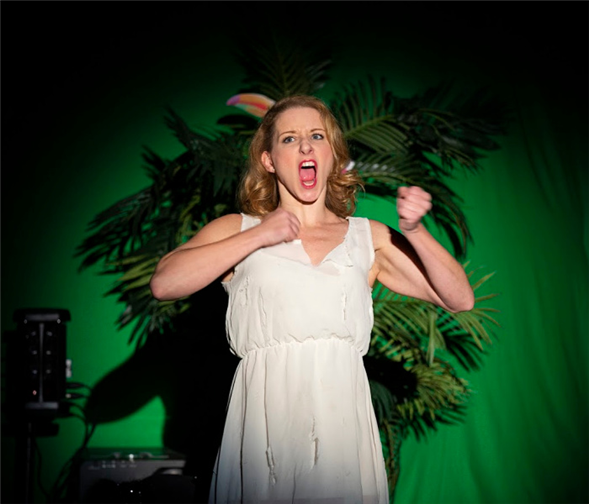Translate Page

A new satire wrestles with the controversial 1933 classic
---
While writing The Making of King Kong, Lisa Clair almost abandoned the project. "It is too big, it is too scary," the recent graduate of Brooklyn College's playwriting program recalls thinking. She wasn't frightened of the oversize title ape; she was wary of the piece's giant themes: racism and sexism. The 1933 King Kong film is now understood as a coded exploration of interracial relationships and the evils of colonialism. In crafting her play about the making of that movie, Clair wanted to make its subtext the text so she could unpack those complex ideas. But, as a white woman, she worried whether she was "equipped" to enter the conversation.
Ultimately, much like King Kong's heroine Ann Darrow, Clair decided to go on the potentially perilous journey to see where it would lead. Now the Obie-winning Target Margin Theater is mounting the world premiere of The Making of King Kong at the company's home in Sunset Park, Brooklyn.
For Clair, the crux of the play was figuring out how to deconstruct the "problematic" film while acknowledging the nostalgic love she and others still have for it. "I'm enamored and horrified by it," the playwright admits. She started by studying not just the film, but also how it came to be. (It had quite the complicated development.) Fay Wray (who played Ann Darrow, the object of the ape's affection) and directors Merian C. Cooper and Ernest B. Schoedsack are characters, and the script is peppered with historical tidbits from the film's production.
But contrary to what the title suggests, The Making of King Kong isn't a straightforward docudrama. As it progresses, fact and fiction blur, things go awry and the play becomes a meditation on privilege, specifically, who gets to tell the story and who's left marginalized on the sidelines.
Clair collaborated closely with the director, Eugene Ma, a Hong Kong native who was aware of King Kong but wasn't as big a fan. "I could sense that it had problematic origins and I didn't really know why," he says. It wasn't until working on The Making of King Kong and rewatching the film that he recognized its discomfiting racial undertones.
As the two developed the satire, they talked a lot about whiteness and ways Clair could mitigate offensive aspects of the original while still addressing its thorny issues. For example, in the movie, the natives of Skull Island are portrayed as savages and are played by black actors decked out in feathers. In the play, the inhabitants are identified as white yoga women, but because the erasure of even distasteful characters of color is questionable, they are played by actors of color. Plus the entire story is narrated by Kevin R. Free, an African-American actor and playwright, who wrote the epilogue and gets the last line. So The Making of King Kong isn't just about the making of the film, but also about the making of the play about the film. It's meta and multilayered, but that's part of the fun according to Ma.
"This project really is about a white person, an ally, trying to trace back their history of privilege," the director says. "Her point of view and her desire to write about, in her words, 'awful white people,' was hugely interesting to me, especially in a way that's not blaming them but just exploding what actually happened."
Even 85 years after its release, King Kong still casts a massive cultural shadow. There's a reason there's a $35 million musical version on Broadway and that Hollywood makes new Kong flicks every few decades. By interrogating this fable from a progressive perspective, the creators hope The Making of King Kong will inspire audiences to think about modern-day monsters, such as inequality.
"King Kong is such a myth of America, it's so ingrained in our storytelling," says Clair. "I feel like white people are at a place where they're becoming woke to their own part in this history. And because we have such extreme times right now, I think our monsters are creeping up, we have to confront them and we have to talk about them and we have to deal with them."
---
TDF MEMBERS: At press time, discount tickets were available for The Making of King Kong. Go here to browse our current offers.
Follow Diep Tran at @DiepThought. Follow TDF at @TDFNYC.
Top image: Molly Pope in The Making of King Kong. Photos by Maria Baranova.